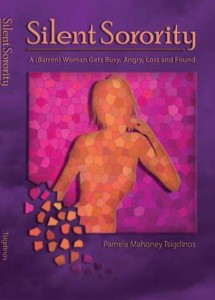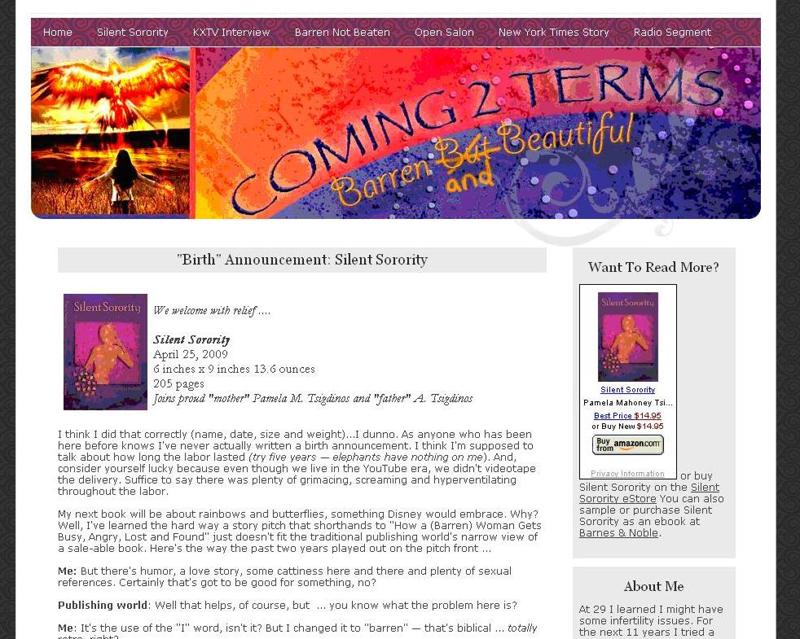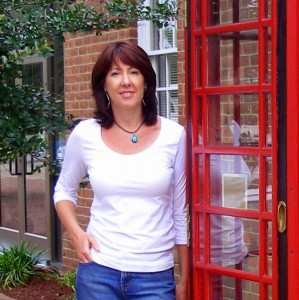 Pamela Mahoney Tsigdinos independently published her book, Silent Sorority, on April 18, 2009, after eighteen months of approaching traditional publishers from her background as a professional marketer.
Pamela Mahoney Tsigdinos independently published her book, Silent Sorority, on April 18, 2009, after eighteen months of approaching traditional publishers from her background as a professional marketer.
She did her due diligence, spent five years writing her book, hired an editor and designer, identified her unique, focused market, and blogged and networked conscientiously to build her platform. (You should see the number of comments on her site.) She researched agents and had some enlightening conversations. The bottom line? She was writing for “too specialized” a target market. No one would publish for an audience “that small.”
Pamela’s niche market? The infertile for whom medical intervention does not work. Those who fall through the cracks of the massive fertility industry ($3 billion in the U.S. alone). A grieving community for whom no books, apparently, are published—not because those readers aren’t there, but because nobody in traditional publishing knows they are.
Pamela is one writer who is also a successful marketer. And she agreed to be my next interviewee on indie publishing.
First—what printer did you use? Why? Was it the price vs. service level, reputation, print quality, or something else?
BookSurge. It was at the time one of two companies that Amazon had acquired.
I did a lot of diligence about what different vendors would provide in the way of services. I wanted control over artwork and cover—BookSurge did offer turnkey, but they also had a very lightweight offering that said, If you provide us with everything, we will assign you a publishing consultant to guide you through the process. It was $300 to turn over my fully-formatted and -designed book.
They sent two different final proofs, with covers, to read. I found a few more typos I didn’t catch in my formatted files and got them back to them for revision. I approved the final galley, and within a week it was up and available for purchase on Amazon.
What service level did you choose, why, and how much did it cost? Were you happy with what you got for the price?
BookSurge no longer exists—it got merged with CreateSpace—so I was lucky, I got the tail end, because CreateSpace at the time was entirely self-service. At BookSurge, I had the name of a person who was my account contact, so I had a go-to person. At CreateSpace, in April 2009, you didn’t have that extra layer of protection in terms of service available. (I recently found a link that compares the BookSurge to CreateSpace offerings.)
Rights: who retains them, and for how long? In whose name is the ISBN registered?
I own my copyright. I did register for it. It’s one of those administrative tasks that are absolutely must-have. I applied to the copyright office a year before my book came out. I submitted for the copyright, ISBN, Library of Congress, all in my own name.
Daniel Poynter’s Self-Publishing Manual is phenomenal. He’s really good about giving self-pub authors help, he’ll sit the book on his website, he’s got a newsletter. It’s been around for awhile, and he’s updated and added a bunch of things.
His recommendation was to create your own publishing company. (It was way too much to do for tax purposes, for me). He has a checklist.
Self-sales: does the printer give author- or bulk-discounts if I want to purchase copies to distribute locally? If the publisher is not associated with a major distribution channel (like Ingram), doesn’t it then cost a lot of money to place physical copies at local bookstores?
CreateSpace is associated with Ingram. CreateSpace allows me to buy one copy and gives me an online store, whereas BookSurge had an author discount only if you bought a bulk number of copies.
My royalties went up when BookSurge merged with CreateSpace. If you click on Buy the Book, it takes you to what looks like a storefront. Amazon completes the transaction, but I get $8.50 for every book sold on my storefront, and on Amazon I get $5.75. My cost for books I buy is only $3.44.
I have had a couple of wholesale distributors buy, but for most folks fertility is a fairly narrow topic, so if you’re a bookseller my book is not necessarily a must-have.
Barnes & Noble—I ended up sending a copy of my book to B&N for review, and I got this very official form letter that said, We don’t believe this title has a broad distribution opportunity, so no, thanks. But I ended up going through Smashwords. The CEO/Founder Mark Coker does an amazing job (for no charge) helping authors convert their manuscripts to ebook formats. He has a relationship with B&N and Sony, and in a matter of weeks—literally, from the time I took it from print PDF to ebook—it became available through B&N. (You can submit your book separately as a Kindle, but you get higher royalties through Smashwords.)
Depending on what you sign up for, the way of quality control, you may get different experiences. But CreateSpace and Smashwords are as good as a bookstore. And I would encourage people to take copies to libraries.
Quality: some people are saying indie publishing companies are not publishers, just really, really, really good photocopiers. Was that your experience? Where you pleased with the quality of what you paid for?
The book quality, in the end, was as good as you’d find in a library or bookstore. I did hire a book designer, which gave me professionally-formatted PDF files that were then uploaded and used for the first book proof. I took the time to get a good book designer. I found her on on Elance, a San Francisco Bay Area marketplace of freelancers. I typed in a proposal, and people bid on the project. Elance is great. You can check references. They take a small percentage of the total amount paid. I also hired a great editor.
You know, If someone just has a personal interest in sharing a story with immediate family and friends, there are tools that allow people to do that. Shutterfly—there are a variety of other ones—there are ways to create mini-photo books. They’re boardbound.
How did you like working with this publisher, personally? Did you find them pleasant and helpful, informative, really inspiring? Or simply business-like? Or did the service kind of suck, but it was worth it for what you got? Would you recommend others use them, and would you use them again yourselves?
Smashwords is very, very professional, and, as I say with BooSsurge, they would send me emails in response to everything I was doing, and at the bottom of each email it said, If you’re not satisfied, here’s the customer service info.
Can you tell us how sales have been?
It’s been really good, based on just word of mouth, and my sales are increasing, month-over-month, trending up as I get deeper into the communities of interest.
I’m contributing articles to blog sites that range from Open Salon to Divine Caroline to Fertility Authority. In some cases I’m compensated for my posts, and sometimes not, but it really does have a multiplier effect. At the Huffington Post, for example, there’s a woman who teaches women’s studies in Houston, and I get involved in those conversations. It does generate a moving flywheel. Get that flywheel spinning, the royalties start coming in.
I set my price by looking at other comparable books. It’s a balancing act. I chose a price significant enough that, if someone truly wanted to buy it, I wanted them to think it was worth the time. Based on other books in the marketplace on this topic, and the fact that it is a first run, I chose $14.95 because it’s under $15, and hardcovers are around $25.
You have to look at the economics of it at all. For the publishing houses to make an investment, they are taking a big risk. Consequently they have to figure out that the market truly is big enough to support a particular title. At the same time, what happens is there are always going to be niche books. I fully understand that my book will never be a best seller. But the people who are interested in it—people in the infertility community—read everything they can. They have the time. They’re sitting in doctor’s offices! These people are voracious.
I’m reaching an international marketplace. In fact, two of my biggest markets are in South Africa and Australia. I don’t know if there would be this opportunity for me without Amazon. Because it’s Amazon.
Interesting point—I did a fair number of interviews with authors who had gone the traditional versus indie route. After a certain time, traditionally-published books became unavailable. With indie publishing, I jokingly say my nieces and nephews will be getting my royalties in perpetuity. I’m finding the people are very loyal readers. They want the book on their bookshelves. My resale price is twice as big as my real price because a lot of those are being sold in Euros. Another woman did go through traditional publishing at the same time I did, but her book was safer and a how-to manual. She and I are listed as comps. Her books went from $15 to $6, and the price of mine is staying constant. I don’t know what was the initial agreement with her publisher. But, you know, my book will always be available.
Is there anything you would have done differently? Any specific advice you have for others considering independent publishing?
The only thing would be to have been given myself more time to do pre-launch book promotion. I was dead set on getting it out by Mother’s Day, so as a result I really rushed my own promotions. I pitched media first and then put out a press release. I know the drill. I had predetermined a number of bloggers and sent them copies and knew full well that they could have given me a thumbs-down. Fortunately the reviews came in positive.
Nonfiction in particular is an easier way to pursue indie publishing than fiction because there are ways to get into industry groups. I wrote a business plan for my book. There’s an industry around fertility, so I know how to work those channels. If you’re writing a book about infertility, you have to be smart and differentiated. I knew that, since 99.9% of the books out there have been written by mothers, I had a unique voice.
Silent Sorority came out on April 18, 2009. I did a fairly heavy amount of promotion in the May-June-July timeframe. I’ve got a community of readers who read my blog regularly. I had a post up called Birth Announcement for my book.

The workload now feels infinitely lighter than trying to get the book ready for publication. That, for me, was the hard process. A really fine-tuned social appointment, a set of reporters I know, Google set for topics. Now it’s seamless. I do this for a living, so it seems perfectly easy to spend an hour a day scoping about who’s writing about what.
Any other points or stories you’d like to elaborate upon? If I missed something significant that you think others should know about, please do talk about it.
I will say to your point earlier that there is nothing easy about publishing these days, whether it’s through traditional or indie. As the author you are 100% accountable for the publishing of your material.
Indie publishing’s got a negative connotation based on the marketplace. I really was very reluctant to move toward self-publishing, worried it would signal that my writing wasn’t of a good-enough caliber. I was extremely hard on myself when it came to the manuscript. I rewrote it three times over five years. I think you really need to think hard about: Are you propagating the myth of junk? Or are you really truly holding yourself to a high standard, such as you’d get from an external source?
I was reluctant to associate myself with anything that could be perceived as vanity press. And let me be clear: broadcasting to the world that you couldn’t conceive isn’t something you do for vanity purposes. In fact, I didn’t tell family and friends that my book was available right away. They found out about it after I’d already sold a bunch of books.
Realistically—I’ve been around the block (I’ve been blogging for three years)—my intent initially was to build a community and see what the level of appetite was for the type of book I was writing. I signed up for a couple of helpful search engines, went diligently and found out what agents work in what topics—Who do these agents represent? Do they look at issues outside conventional wisdom? And I put very specific pitches together. What I found was really interesting. The response was, “You’re involved in a particularly unusual topic that doesn’t necessarily fit neatly into the traditional publishing world model, so I don’t know that I’d be successful at pitching your idea. It doesn’t fit into their categories.”
Would my idea in itself be interesting because it’s different? I had three or four conversations with agents about this, but they didn’t feel they could make an adequate commission (reading between the lines). Pub houses were tightening the filter, so it had to be a blockbuster type of book.
Which reminded me of the movie studios. There was a time when if it didn’t fit the model it wasn’t used.
I spent eighteen months chasing the traditional publishing world, and I thought, Okay. I work in marketing. I’m just going to do that. I became the contractor for my own book.
I think we’re in the really early days of indie publishing. There are those of us who have decided we don’t fit the formula. When I’m talking to those who have created an economic arbiter—like Hollywood—I don’t lead with the fact that I’ve self-published, I just say it’s available.
Publishers were once the arbiters of good taste. Now it’s the readers who decide what’s good and what’s not. I’ve got thirty reviews on Amazon—thirty-two if you count Amazon.ca—twenty-eight five-star and two four-star.
You said you asked yourself, What is my objective, as an author?
Yes. I was feeling isolated in my infertility experience, I had enough angst about it that I went to the library, I went online. I could find no books by women about infertility who were not mothers. It became evident that there were a whole bunch of issues that hadn’t been covered—the stigma associated with failed infertility treatment. There were no appropriate guidelines for how you grieve and move on through that experience. I got so annoyed, I thought, Hell, I’ve got to change that.
I was shocked by how the fertility industry had become all about the business, not about the individuals seeking treatment. I was flying back from a business trip, and I was in business class, and this young woman was chatting near me with the flight attendant. The flight attendant asked, “What do you do?” and she said, “I’m a med student. I’ve been doing a lot of research, and the highest-paid doctors are in fertility.” Fertility and plastic surgery, those were her two options. The highest money. That’s nasty.
Because there are huge emotional issues associated with finding out you may never have a child. One of the things I put out to people is there is a belief—in society—that if you never actually delivered a child you have no loss. There is this weird sense that you have to have diapered a baby, or you have not suffered any real loss. The creation of embryos, really truly—when you have for the first time gotten an alpha pregnancy—you associate a life and a set of dreams with those early days. To know that others disregard that completely? It’s devastating that there is no support system. So if you’re out there trying to work through that set of emotions, you don’t have a natural safety net, a safe harbor to work through the loss of a fragile dream.
The reader email I get now breaks your heart.
They say, “Nobody understood what I was living through. You have given me a voice I never had.”
 Pamela Mahoney Tsigdinos is the author of Silent Sorority. She can be reached through both her blog and her book.
Pamela Mahoney Tsigdinos is the author of Silent Sorority. She can be reached through both her blog and her book.

Victoria, this was amazing to read! Thank you for sharing this, both you and Pamela. It’s so interesting to see how everyone’s journey is different. I have a friend who might really appreciate that book, and I’ll pass the word along.
Self-publishing looks less scary to me these days as I learn more about it!
Thank you, Michelle! Pamela’s incredible, isn’t she? The indie publishing world is bursting out with some amazing stars, even now in the very early days.
The more people like Pamela I meet, the more excited I am about this incredible moment in the history of publishing.
This has been a good series on indie publishing, Victoria.
K
Thanks, Kathryn! There will be more. I’m doing Bob Spears this week and currently interviewing Peter Bowerman for next week. There are ZILLIONS of really good professionals out there getting involved in this. It’s staggering.